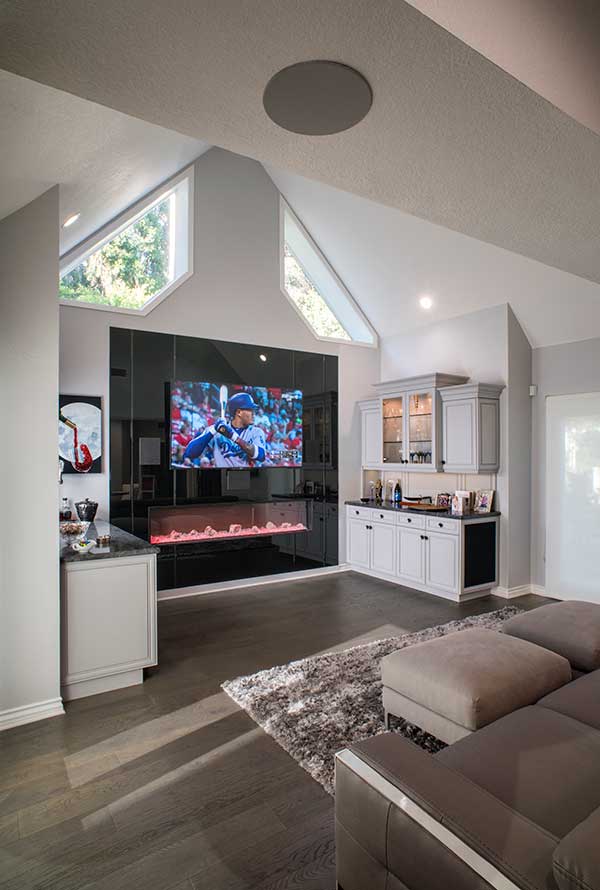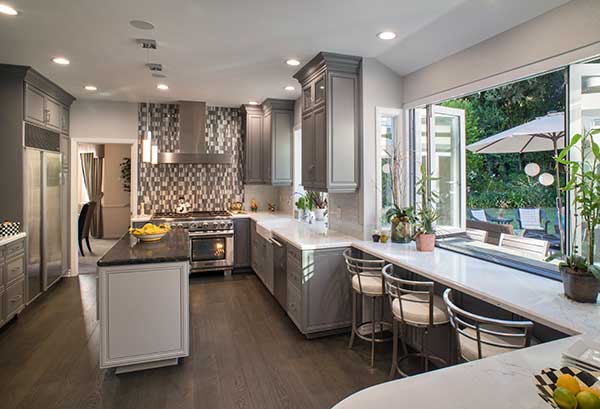Home Remodeling: How to Select a Quality Architect and Contractor
A Free Report by Roger Perron Design and Construction, Design-Build Contractor
Californians spend more than $39 billion on residential construction each year. Many homeowners have discovered that improving their current home with an updated kitchen or bathroom, an addition, an accessory dwelling unit (ADU), new windows or a new roof can be a better investment than trying to sell their home and buying a new one.

The cost of adding a room or doing home remodeling can be substantial, so consumers need to take some time and care in planning their home improvement project. Additionally, selecting the wrong contractor can be expensive, cause inconvenience and headaches. So how do you know which contractor to choose?
Basics
First let’s cover some basics:
- License: Make sure the contractor is licensed for the type of work you plan to have done. License numbers with the lowest numbers have been active for the longest period of time; this could mean the company has more experience. Contractors can be looked up at the Contractors State License Board by name or contractor license number at www.cslb.ca.gov, which should match their name (sometimes contractors “borrow” other license numbers, which is illegal!).
- References: Get references of previous clients from the contractor. Determine whether he did the work on time and in budget and what the general professionalism of the contractor was. Ask to see photos of his past work. If a contractor has a lot of references with a good report, then it’s a good chance he’s consistent.
- Contract: Make sure you have a written agreement before beginning any work and that the contract is specific, including:
- The name, address and license number of the contractor.
- The approximate dates when work will begin and will be completed, which is required by the Contractors State License Board.
- A detailed description of all work to be done and quality of materials to be used. Ideally the contract should include a construction cost breakdown (estimate) of all labor and materials with subcontractor costs, profit and overhead indicated. This way if there are any changes to the scope of the work, the associated costs can be adjusted up or down in a fair manner.
- Specification of whether any additional or related work needs to be done in order to comply with laws or building codes. In other words, the job must be done per code.
- Payment schedule: the schedule of payments should be specifically tied to the approximate amount of work done, including the materials, labor and equipment to be supplied by the contractor.
- Any down-payment should not exceed $1,000 or 10% of the contract price, whichever is less.
- One-year warranty guaranteeing quality of workmanship.
- A provision that the contractor must obtain any necessary permits.
- Insurance: It’s important that a contractor has adequate liability and Workers’ Compensation insurances. (We’ll cover this more in depth later.)
Beyond the Basics

Plan ahead: Determine your needs, priorities and goals for the job. Also determine your budget, including approximately 10% over the estimate for additional work that you may want done. Formulate a good idea of what you must have in the project and what you can do without.
Be an informed consumer: Learn about the type of work you plan to have done. Review magazines and use the Internet.
Rapport: You should have a good rapport with the contractor. Observe their level of professionalism. Courtesy, respect, punctuality, dependability and the ability to communicate are some of the most important attributes a contractor must have, next to their basic technical skills.
Years of Experience: Although this is not a hard requirement, it pays to hire a contractor who has at least 20 years experience or more in the line of home remodeling work you’re hiring him for. Selecting the right contractor will help ensure you get a great home improvement product, with years of increased enjoyment.
Why Select a Design-Builder as Opposed to an Architect?
When you’re planning a major home remodeling project, who do you turn to? The first choice is to hire an architect and a contractor separately, and the second choice is to hire a single company that handles the architectural design and the construction all under one company umbrella. This is called a design-builder. The design-“bid”-build method occurs when the architectural plans are produced first, and then various contractors bid on them. The question is, which of these methods is most cost effective for the homeowner?
The design-build company is one that contains both the design team (architects, engineers and landscape architects) and the construction team (the general contractor, electricians, plumbers, etc.) all within the same company and team. They work together from the beginning, creating the initial plans, and then executing them through to project completion.
With the design-build method, the homeowner saves time and money in a variety of ways, ranging from lower overall project cost, faster construction speed, fewer contracts to manage and less cost increase. The chart below shows some actual percentages of savings obtainable by having all experts together working on the same team:

The Top Ten Reasons Why a Design-Build Professional is the Best One to Hire
The following points are ten key reasons why a design-builder is the better type of professional to hire for planning and completing a home remodeling project:
- A design-builder is more in tune with the owner’s remodeling budget and can therefore create a design that will be best able to stay within it.
- An architect tends to be somewhat detached from the building part of the project; a design-builder, however, because of his intimate familiarity with the designs, building process and materials, will tend to do a better job.
- The architectural plans from an architect can sometimes be vague or unclear causing conflicts between the architect and builder.
- A builder who bids the job from a set of architectural plans will potentially cause conflict with the owners for missing data and will use this to add extra charges to the homeowner.
- A qualified design-builder will save the owner money by preventing any architect/builder conflicts.
- A qualified design-builder will simplify the design process since only the drawings that are necessary for that specific job will be done.
- A design-builder’s drawings are more understandable since they use a standard medium for the drawings that everyone in the office and field is familiar with.
- The design-builder is not only interested in the design, but has responsibility for the final product.
- The design-builder process saves money since the homeowner does not have to pay the architect a heavy fee to oversee the project once a week, which can be 10% of the overall construction contract price.
- A qualified design-builder is very likely to have an in-house architect who is also responsible for the project.
Go With the Organized Contractor

Everyone’s heard the horror stories regarding contractors…right? You know the ones… they’re never at the job site, don’t return your calls, their phone is suddenly disconnected, they leave your place an absolute mess, don’t keep you informed on the progress of your project, are rude, chaotic and disorganized, and sometimes vanish into thin air leaving you in an all-around bind.
To keep these problems from happening, it is important to do your research and hire someone who is organized. If he has had any business training, this could be an excellent indicator that he will be organized and on top of things to ensure your project is well executed.
In addition, a good contractor will be informative, friendly and keep you “in the loop.” If he has a website, portfolio or showroom…all the better! Another tip in choosing a contractor is to take a peek inside his vehicle – if it’s organized, this is a good sign that he’ll keep your project organized, too.
The job of the contractor requires considerable organizational knowledge and skills to keep your project moving. He has to schedule himself, his crew and other subcontractors, make arrangements for the proper tools, machinery and building materials to be at the job site on a specific date and time, pull all the necessary permits to do the job so your project doesn’t come to a halt, oversee the project, collect money, pay bills and troubleshoot problems immediately that come up.
Finally, make sure you’re comfortable with your contractor. You should feel you’re in good hands, trust his skill level, judgment and time management skills. These simple things should keep your stress level down and ensure a most favorable outcome.
Why You Should Make Sure the Contractor You Hire Has Insurance

One of the important issues in selecting a contractor is to make sure he has the various types of insurance coverage. It just makes good sense to demand that he have the necessary types of insurance before you go forward with your home remodeling project.
It is a state law in California that all contractors must have Workers’ Compensation insurance, unless they have no employees and do all the work themselves. Contractor certificates of insurance need to be currently filed with the Contractors State License Board and a record of that can be found at www.cslb.ca.gov.
If a contractor’s employee gets hurt and the contractor is covered by Workers’ Compensation insurance, then that liability is covered by the insurance carrier, not by the contractor or homeowner. Since such major injury claims can go on for years and cost large amounts of money, it’s vital when hiring a contractor to ensure that he has this coverage.
The cost of Workers’ Comp insurance has risen dramatically over the last decade due to fraud and other factors. The Governor and California state legislature have instituted effective reforms several years ago, but the cost of this insurance is still high.
Some contractors try to avoid carrying this type of insurance so they can be more competitive in price. But they also may cut corners on the quality of work to your home, too! A true professional will carry insurance–period.
In order for a general contractor to hire a subcontractor, the subcontractor must provide proof of Workers’ Comp insurance. General contractors are audited each year by their carriers to ensure that no uninsured subcontractors were hired.
Liability insurance is not required by law, but it’s vital for many reasons. This type of insurance pays for damages that might occur to a property based on errors made by the contractor. Once again, carrying this type of insurance is an indication of the professionalism of the contractor.

Liability coverage helps to ensure that the quality of the work done will be good for years to come. If a problem crops up with the work, even years later, liability insurance is a method to gain relief.
If your contractor damages your property and doesn’t carry general liability insurance, you or your insurance company could end up paying for the damages.
Lack of this insurance would prevent a contractor from working on more upscale projects that require certificates of insurance prior to starting any work.
Verify your contractor’s insurance coverage before hiring him. Again, it’s an indication of professionalism that you should make a requirement for your remodeling project.
Summary
The basics are:
- Make sure the contractor has a current license.
- Get references.
- Make sure you get a properly filled out contract.
- Make sure the contractor has proper and current insurances, including Workers’ Comp and general liability.
- Go with the organized contractor.
- Use a design/builder over an architect.
About Roger Perron
You can have more space and affordable elegance with Roger Perron Design and Construction, Design Build Contractors, offering architectural design, home remodeling and additions of all types, as well as custom new home construction— all within one company.
- Architectural Design
- Kitchen and Bath Design
- Kitchen and Bathroom Remodeling
- Home Additions and Home Remodeling
- Custom New Home Construction
We sincerely believe that our clients deserve only the very best home remodeling and new home design and construction, consisting of superb architectural design, quality materials, meticulous workmanship and experienced supervision, done right and with minimum inconvenience.
We start out with an affordable home design second to none. Then we perform construction services employing our own experienced staff, alongside proven licensed and insured subcontractors with whom we have worked for years. We have been doing this successfully for over 25 years in the Los Angeles area, producing superb results above homeowners’ expectations and within budget.
Proven by work successfully completed, we have earned an outstanding reputation. See below for details on how to contact us for a complimentary home design consultation.

All photos throughout this report are of jobs designed and built by Roger Perron, Inc.
Call us for a Free Consultation. We create visual designs that really bring about the best possibilities anyone could imagine for their home. Roger Perron personally oversees these designs.
Whether you want a remodel, addition, accessory dwelling unit (ADU) or a complete new home, you can have everything you want beautifully arranged for ease of use and smooth access, as well as comfort and good looks — an aesthetic result. We also carry forward the construction to bring about a home you can be proud of.
Barbara Perron (Roger’s wife) or Jobee, our assistant, will usually take your call and the journey starts there. Roger Perron and his team will then take good care of you.
Call Barbara NOW for a complimentary consultation!

Office Telephone Numbers:
(818) 241-8869
(626) 797-9969
(310) 471-4072
(323) 664-7001
Finding the Best Home Remodel Contractors Los Angeles
Searching for “home remodel contractors near me” can be overwhelming, but our dedicated team simplifies the process. We provide comprehensive remodeling services that cover every detail, ensuring your project runs smoothly from start to finish. Our reputation as leading remodeling contractors in Los Angeles is built on our commitment to customer satisfaction and exceptional craftsmanship.
We offer a wide range of services to meet your remodeling needs. Whether it’s updating an outdated kitchen, Living Room Remodel, Dining room remodel, Bathroom Remodel, adding an extension, or transforming your entire home, our skilled team delivers outstanding results. We pride ourselves on being the trusted choice for homeowners seeking home remodel contractors near me.
Ready to start your home remodeling project? Contact us today to discuss your vision and get a free Consultation.
Our experienced remodeling contractors in Los Angeles are here to help you every step of the way. Trust us to turn your house into the home of your dreams with our top-notch remodeling services.


